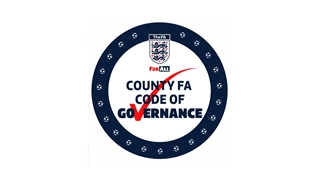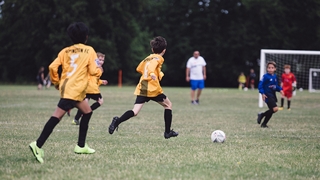
We have spoken with our director of football development, James Kendall, to discuss all things grassroots football, including key challenges and opportunities for the grassroots game this year, and beyond.
James, how has the 2023-24 season gone from a grassroots perspective?
Overall, there’s a huge amount to be positive about. Participation numbers are healthy particularly in youth football and the women and girls’ game is thriving after the recent success of our Lionesses which has undoubtably had a hugely positive impact. It’s also good to see that the disability game continues to rebound positively post COVID.
We have continued to work closely with the County FA network to ensure clubs, leagues and communities across the country have the support they need and we’re really looking forward to building on this momentum as we head into a key part of the season, and we are already developing exciting plans for the years ahead.
You recently held the consultation with 'Our Game' roadshows to kick-off thinking on the new grassroots strategy cycle for 2024-28, how did they go and what were the emerging themes?
It was fantastic to hear first-hand from those involved across the grassroots game and the feedback we’ve received from the 16 face-to-face events that we held across the country was brilliant, and the response to our survey was strong too.
The purpose of the consultation was to listen to the grassroots football community we serve, to understand the challenges they are facing on the ground and what we can do to help solve them. We structured it around a few key areas including facility quality and access, volunteers across our game feeling valued and supported, improving behaviours on and off the pitch, supporting clubs that get bigger but find the transition a challenge and players wanting access to different playing formats.
The face-to-face events were positive and honest and, alongside the survey, have given us what we need to shape our next four year strategy and ensure the grassroots game continues to thrive.
What is the current state of facilities and pitches across the grassroots game? Is there work to be done?
There's always work to be done. Improving facilities and pitches continues to be a key focus for us as it is always one of the main priorities raised when we carry out a grassroots survey. For our current strategic period, we set a target of 5,000 quality grass pitches which we will achieve and go beyond.
The Football Foundation play a hugely important role in this process, and we also work together to provide clubs up and down the country with the advice and support they need to get their pitches looking and playing their best – whether that be tips and tricks for maintaining a grass pitch through the new PitchPower tool, training for groundskeepers, or funding for pitch improvement works.
We're making substantial inroads, but we know that the facility transformation that we’re aiming for will take a few more years. In the meantime, we’d certainly encourage all grassroots clubs to find out more and access support for grass pitches and facilities via the Football Foundation’s website.
Since COVD we know that people prioritise their time differently – how has this impacted grassroots football and what broader trends are we seeing with our clubs and with players in the affiliated game?
As you would expect, with more people playing, more teams are affiliating particularly in youth, female and disability football which is brilliant for the future of the game and our local communities, a trend we believe will continue during the next strategic cycle. On the flipside we are also seeing less adult male 11-a-side affiliated football being played, with our hypothesis that many continue to play but enjoy the flexibility of smaller casual formats. We are doing some work to better understand this trend and how we can best support it.
From a club perspective, we’re seeing significant growth in larger clubs which are absorbing much of the growth in the game.
So, the landscape is shifting but the most important thing is that people are playing the game in great numbers. It’s with that in mind that we may need to look at providing even more flexibility in playing provision from 2024 onwards.
What is being done to help more disabled people get into football after the pandemic, which saw numbers fall significantly?
In October 2021, we launched a new plan for Disability Football called Football Your Way, to help the disability game recover as we emerged from the pandemic.
As part of this, we recently launched a programme called Comets which is a recreational, pan-disability programme for disabled boys and girls between 5-11 years of age to play and get into football whatever their disability.
Sessions are focused on helping disabled children have fun, whilst building confidence, independence and social relationships, and provides an environment in which participants can feel safe and belong. The programme is currently in pilot stage, so keep an eye out for the wider launch later in the 2023-24 season.
We also recognise the importance of supporting grassroots clubs in growing disability provision. That’s why we’ve teamed up with the Activity Alliance, providing clubs with a new training toolkit to help them to become more inclusive of disabled people, both on-and off-pitch. We would encourage all clubs to sign up to this and start their journey in growing disability provision by visiting our England Football website.
Cost of Living is an issue that has affected many clubs across the grassroots game. What support is there for clubs struggling the current climate?
The Cost of Living is, of course, a global issue and is affecting many people across the country and we are very mindful of the effect that it is having in the grassroots game.
To help with this, we have introduced a number of initiatives to support clubs. We’ve created a £6m Football Foundation Energy Fund for grassroots clubs to help reduce energy consumption and installing renewables. We’ve also launched the Howdens' Game Changer Programme in partnership with England Football which will see the kitchen company aim to fund £3m worth of kitchens over three years for England Football accredited grassroots clubs.
We have also recently set up a Cost of Living Resource Hub for clubs on our website where lots of helpful information and links can be found.
Is participant behaviour getting worse across the grassroots game and how much of a concern is it?
We have been very clear that all forms of unacceptable behaviours and abuse, whether on or off the pitch, are completely unacceptable – and we are incredibly passionate about ensuring anyone who wants to play football can do so in a safe and inclusive environment.
Through our whole game ‘Love Football. Protect The Game’ initiative, new policies, procedures, and regulations have come into force from the start of the 2023-24 season. This has been introduced to help address unacceptable conduct on the pitch, on the sidelines and in the stands, and to ensure that the actions of the minority do not spoil the game for everyone else.
In July 2023, we also launched our new Refereeing Strategy which details our goals in making refereeing an attractive career choice, improving referee experience, making refereeing more inclusive, and enhancing referee performance and development.
For the grassroots game, we have announced ground-breaking new regulations from the start of this season, including point deductions for teams whose players or coaches commit repeated offences of serious misconduct. Elsewhere, the trial of bodycams for referees has continued in the 2023-24 season, and we will be looking at expanding this to an additional four grassroots adult leagues soon.
Our message is simple. Everyone can play their part in helping to improve the behaviour and culture in our game. Together, we can create a safe and enjoyable environment for all.
We know our grassroots volunteer workforce are essential for the smooth running of the game, how are we going to continue to support and grow this key group of people?
They really are which is why we’ve recently launched our Volunteer Game Plan which has two bold intentions – for the volunteer workforce to feel more valued and connected to us as the FA, and to develop and grow a volunteer community that represents and supports the needs of the game.
Our delivery is in its early stages, but we have launched a new volunteer My England Football membership programme to reward and recognise volunteers in a more structured way and are providing more support to clubs to help them attract, retain and develop volunteers. We are also working on a new brand identity for our volunteers which we hope to launch soon.
We also want to have a real impact on all volunteers by making football administration easy, whether registering players, affiliating and accrediting clubs or recording results. We’ve invested significantly in recent seasons to improve our digital technology and volunteer experience and recent feedback has been very positive.
What are you most excited for in the next strategy cycle – where do you see the biggest opportunity to positively change the grassroots game for the better?
Firstly, I’m tremendously proud of what we have achieved together across the game over the last four years particularly with the hiatus caused by COVID. There will be time to reflect properly at the end of this season, but we have collectively – across the County FAs, leagues and clubs – made huge progress as the game has continued to grow, not least in the women and girls' game of course, but also with our technology infrastructure and grass pitch improvements.
In addition, it’s important to highlight safeguarding which is one of the most important services we provide. So far this season, 100 per cent of County FAs that have been independently assessed continue to maintain our Safeguarding 365 standard and the third year of our Play Safe campaign reached a record three million people which we were delighted about.
The next strategy cycle is really about evolution rather than revolution, but with even more focus on the areas of the game where there is the greatest need, stimulated by what we heard last summer. Ultimately, we want to share this with all our football partners so we have a common base on which to focus our collective efforts.
We are excited about the opportunities ahead, and I’d personally like to thank everyone across the grassroots football community for their ongoing hard work, dedication and commitment that ensures people of all ages and abilities can continue to play the game they love.









